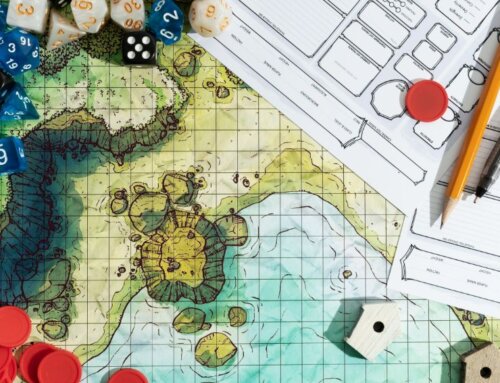Ever wondered about the meaning behind the acronym NPC in games?
It’s commonly believed to stand for Non-Player Character, but have you ever considered the intricate role these characters play beyond just filling up space in the game world?
NPCs are more than just background figures – they hold the key to unlocking hidden quests, shaping your gameplay experience, and even revealing unexpected surprises.
So, next time you encounter an NPC in a game, remember, there’s often more to them than meets the eye.
Key Takeaways
- NPCs stand for Non-Player Characters in games, controlled by the game system.
- NPCs play various roles like providing quests, companionship, guidance, and challenges.
- Interactions with NPCs contribute to immersive gameplay, storytelling, and character development.
- NPCs significantly impact gameplay by enhancing player engagement, decision-making, and world immersion.
Definition of NPC in Gaming
In the dynamic realm of gaming, the term NPC, short for Non-Player Character, holds a significant role in shaping the virtual worlds players immerse themselves in. NPCs aren’t controlled by players but by the game system itself. Their behavior is meticulously designed, and NPC behavior analysis is crucial in creating immersive gameplay.
These characters serve various purposes in games, such as providing quests, acting as companions, mentors, enemies, or vendors. Player-NPC interactions are essential as they can lead to rewards, information, and progression in gameplay. Engaging with NPCs adds depth to the gaming experience, offering players a chance to explore diverse storylines, receive guidance, or even uncover hidden treasures within the game world.
Role of NPCs in Video Games
Exploring the intricate web of video game dynamics, NPCs serve as pivotal components in shaping immersive gameplay experiences. NPCs contribute significantly to the storytelling dynamics of a game, engaging players through interactions, dialogues, and quests. Their roles go beyond mere plot advancement; they add depth and atmosphere to the virtual worlds players explore.
NPC quest diversity enhances player immersion, offering a wide array of challenges, tasks, and rewards. Interacting with NPCs not only unlocks new content but also fosters relationships and character development. By guiding players, introducing challenges, and influencing decision-making, NPCs play a crucial role in enhancing the overall gaming experience, making the virtual worlds more vibrant and engaging for players.
Significance of NPCs in Gaming
NPCs in games serve as more than just background characters; they’re vital components that shape the very essence of immersive gameplay experiences. Interacting with NPCs isn’t merely a side activity but a crucial element that can unlock new quests, provide valuable information, and offer rewards.
These interactions enhance player engagement by guiding them through challenges, facilitating character growth, and influencing decision-making within the game world. The impact of NPCs goes beyond surface-level interactions, adding depth to storytelling, creating emotional connections, and increasing replay value.
NPC Vs. Player Character Differences
Distinguishing Non-Player Characters from Player Characters in games is essential for understanding their distinct roles and impact on gameplay. NPCs, controlled by the game’s software, serve various functions such as advancing the plot and providing tips, contrasting with Player Characters that players directly control.
The actions and reactions of NPCs are predetermined by the game’s programming, setting them apart from Player Characters who act based on player decisions. Interacting with NPCs can enhance player immersion by offering quests, services, and information, adding depth to the game world.
This contrast in NPC interactions versus Player Characters’ actions contributes significantly to the overall gaming experience, shaping the narrative and gameplay dynamics.
Evolution of NPCs in Gaming
From simple scripted characters to dynamic entities with unique personalities and complex interactions, NPCs in gaming have undergone a remarkable evolution. The evolution of character design has transformed NPCs into integral components of game narratives, offering quests, challenges, and services that enhance the overall gameplay experience.
Player NPC relationships have evolved to be more immersive and meaningful, with NPCs guiding players, aiding character development, and influencing in-game decisions. Modern NPCs exhibit diverse behaviors, emotions, and storylines, contributing to the depth and emotional connections players experience.
This evolution reflects advancements in AI, game design, and storytelling techniques, elevating the interactive and immersive nature of video games. The dynamic evolution of NPCs has significantly enriched the gaming experience, creating more engaging and interactive virtual worlds.
Impact of NPCs on Gameplay
Exploring the impact of non-player characters (NPCs) on gameplay reveals a multifaceted role that extends far beyond mere scripted interactions. NPCs in games contribute to player engagement by offering dynamic behavior and diverse storytelling elements.
Their behavior dynamics can range from providing quests, services, and challenges to guiding players through the game world. By immersing players in interactive narratives, NPCs enhance game immersion and create emotional connections. These characters not only aid in character development but also enrich the overall gaming experience by adding depth and complexity to the virtual environment.
Through their interactions, NPCs enhance decision-making processes, increase replay value, and foster a sense of community within the game world.
Future Trends in NPC Development
In the evolving landscape of gaming, upcoming advancements in NPC development promise to revolutionize player experiences through enhanced AI algorithms and dynamic character interactions.
Enhanced AI behaviors will bring NPCs to life like never before, providing more realistic responses and actions. These NPCs will possess dynamic personalities and emotions that adapt based on player choices, making interactions feel more authentic and engaging.
With advancements in technology, future NPCs could feature advanced speech recognition and natural language processing capabilities, further blurring the line between human and AI interactions. Virtual reality and augmented reality are set to enhance NPC interactions, offering immersive and personalized experiences that respond to player input.
Collaboration between game developers and psychologists may also lead to NPCs with deeper psychological complexity, enriching interactive storytelling elements in games.
Conclusion
In conclusion, NPCs are the unsung heroes of gaming, adding depth, immersion, and excitement to the player experience. From providing quests to creating a vibrant game world, NPCs play a crucial role in shaping gameplay.
As technology advances, NPCs will continue to evolve, offering even more interactive and engaging experiences for players. So next time you encounter an NPC in a game, remember to appreciate the unique contribution they make to your gaming adventure.
Related articles:
https://ps3trophies.co.uk/entertainment/2024/04/12/what-does-io-mean-in-games/
https://ps3trophies.co.uk/entertainment/2024/04/11/what-games-are-free-on-nintendo-switch/






Leave A Comment